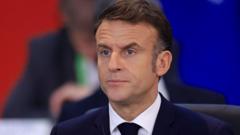In a significant move, President Emmanuel Macron revealed the formation of a commission comprising French and Haitian historians to delve into the impact of the heavy debt placed on Haiti, which marked its independence 200 years ago.
French-Haitian Commission Established to Address Historical Debt

French-Haitian Commission Established to Address Historical Debt
France announces a panel to explore historical ties with Haiti and the ramifications of the independence debt imposed on the nation.
The panel seeks to promote understanding and reconciliation between the nations while exploring the implications of a substantial historical financial burden imposed by France on Haiti during its early years as a free nation.
France's President Emmanuel Macron has announced the establishment of a commission aimed at examining the intricate history between France and Haiti, alongside the profound effects of a massive debt that Haiti was forced to assume in the aftermath of its independence. This development comes two centuries after Haiti's liberation from French colonial rule in 1804, when France demanded a staggering compensation of 150 million gold francs (later reduced to 90 million) from the newly-formed state to compensate former French slave owners, marking a significant chapter in Haiti's tumultuous history.
This crippling financial obligation was not settled until 1947, and it contributed to Haiti's ongoing struggles, rendering it one of the most impoverished and unpredictable nations in the Americas. The heavy economic toll of the debt has fueled resentment among the Haitian populace, prompting calls for France to acknowledge this historical injustice and provide reparations.
In his remarks, Macron stated that the debt "put a price on the freedom of a young nation," and signaled the need for honest exploration of this legacy. "Once this necessary and indispensable work has been completed, this commission will propose recommendations to both governments, so that they can learn from them and build a more peaceful future," he remarked.
Monique Clesca, a Haitian writer, emphasized in a recent interview with Le Monde that acknowledgment of the debt's injustice could serve to restore France's waning influence in its former colonies. She asserted that such recognition would not erase past harms but might alleviate some of the deep-seated pain felt by the Haitian people.
At present, Haiti faces severe socio-economic turmoil, with rampant gang violence claiming more than 5,500 lives in 2024 alone and driving over a million individuals from their homes. The transitional presidential council in Haiti, which aims to restore democratic governance, has notably struggled to facilitate elections that have been long overdue.
France's President Emmanuel Macron has announced the establishment of a commission aimed at examining the intricate history between France and Haiti, alongside the profound effects of a massive debt that Haiti was forced to assume in the aftermath of its independence. This development comes two centuries after Haiti's liberation from French colonial rule in 1804, when France demanded a staggering compensation of 150 million gold francs (later reduced to 90 million) from the newly-formed state to compensate former French slave owners, marking a significant chapter in Haiti's tumultuous history.
This crippling financial obligation was not settled until 1947, and it contributed to Haiti's ongoing struggles, rendering it one of the most impoverished and unpredictable nations in the Americas. The heavy economic toll of the debt has fueled resentment among the Haitian populace, prompting calls for France to acknowledge this historical injustice and provide reparations.
In his remarks, Macron stated that the debt "put a price on the freedom of a young nation," and signaled the need for honest exploration of this legacy. "Once this necessary and indispensable work has been completed, this commission will propose recommendations to both governments, so that they can learn from them and build a more peaceful future," he remarked.
Monique Clesca, a Haitian writer, emphasized in a recent interview with Le Monde that acknowledgment of the debt's injustice could serve to restore France's waning influence in its former colonies. She asserted that such recognition would not erase past harms but might alleviate some of the deep-seated pain felt by the Haitian people.
At present, Haiti faces severe socio-economic turmoil, with rampant gang violence claiming more than 5,500 lives in 2024 alone and driving over a million individuals from their homes. The transitional presidential council in Haiti, which aims to restore democratic governance, has notably struggled to facilitate elections that have been long overdue.





















